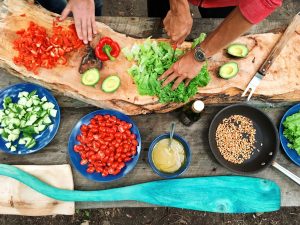This is a topic I’ve been wanting to write about for ages and a media quote has spurred me on. I think we all know someone suffering from depression and the incidence seems to be on the rise. Depression is a multi-factorial disorder, something that was highlighted to me in a conversation to a journalist this week. I don’t believe that just changing one thing will be the cure. You can have the perfect diet but could still suffer, so instead it’s seeing diet as part of the picture and combining this with medication, therapy, sleep patterns, exercise and all round lifestyle.
Looking through some of the recent evidence on diet and depression an instant pattern emerges. Eating a balanced diet that relies less on processed convenience foods and more on eating from scratch is the answer. More fruit and veggies, wholegrains, olive oil, fish, low fat dairy is associated with a decreased risk of depression.
An antidepressant food score was worked out by researchers, looking at the nutrient density of foods that have clinical evidence for helping in depression. The top foods were oyster, seafood, organ meats, leafy greens, lettuce, peppers and cruciferous vegetables.

Top antidepressant nutrients (in no particular order):
Folate
Iron
Omega 3’s
Magnesium
Potassium
Selenium
Thiamine
Vitamin A
Vitamin B6
Vitamin B12
Vitamin C
Zinc
Tryptophan
Fluid
Now it’s usually more helpful to think about nutrients in terms of foods, so here are some top ways you can boost your antidepressant nutrient intake.
- Eat regular meals – the brain needs glucose as fuel and eating regularly helps prevent blood sugars dropping too low which can give symptoms of fatigue, tiredness, lethargy.
- Include healthy fats in the diet to nourish the brain. Oily fish, nuts, seeds, olive oil are all good ones. Aim for 2 portions of oily fish a week.
- Wholegrain foods are good sources of zinc, and B vitamins. Think wholegrain bread products, brown rice, brown pasta, grains.
- Ensure you eat protein regularly for tryptophan, iron and zinc. Tryptophan is thought to play a key role as it is a precursor for the neurotransmitter serotonin. Wholegrains, fish, poultry, eggs and seeds can help with this.
- Green leafy veggies contain folate, iron, potassium and magnesium plus vitamin C. Another reason to get crunching your veggies.
- Orange veggies such as sweet potatoes, orange peppers, carrots and apricots plus green leafy veggies are sources of vitamin A.
- Even slight dehydration can affect your mood. The brain is 78% water. Reducing caffeine and replacing with non caffeinated drinks, mainly water will help. Moderate intake of alcohol can be ok but watch the interactions with medications and too much alcohol can increase anxiety/depression.
Following a Mediterranean style of eating with a focus on fruit, vegetables, wholegrains, protein, oily fish and healthy fats is a great way to help combat depression. It may not be the cure but it is definitely a large part of the puzzle.
Dietary patterns and depression risk: A meta-analysis. Psychiatry Research, July 2017
Diet quality and depression risk: A systematic review and dose-response meta-analysis of prospective studies. Journal of Affective Disorders, January 15, 2018
Antidepressant foods: An evidence-based nutrient profiling system for depression. World J Psychiatry. 2018 Sep 20;8(3):97-104
Pingback: Are there foods good for mental health? – Health Drawing Book